- Home
- Chris Wraight
The Path of Heaven Page 25
The Path of Heaven Read online
Page 25
Arvida did not respond to that. The threshold surged towards them, crackling and violent. A crystal lazily rolled above them, forming a moving lintel to their entry point. The Stormbird dropped in response, fighting to maintain alignment with the gaps ahead.
Aether-lightning surged, whipping and writhing, nearly punching clean through the Stormbird’s thruster-housing. The pilot applied more power, and the gunship lurched under the shadow of the rotating facets, across the shimmering threshold, into the vortex beyond. For a moment, the viewports went blank, blazing with a cold, diffuse light.
Then they were through. The Stormbird swung about, holding position above the others that had already emerged.
Ahead of them lay the heart of the inner sphere, itself the size of a world. Its interior was dark like the true void, barely lit by the shell of lightning-crystals that orbited it. From below the gunships’ position, at the nadir of the galactic plane, boiled a furnace of many colours – a whirlpool into the vacuum, kaleidoscopic and hard to look at. Both Yesugei and Arvida knew what those false colours signified – a rupture in the matter of the universe, leaking the stuff of the immaterium.
Neither of them, though, was looking at the rupture. They were looking at what was above it: vast, slender, as black as burned iron, underlit with faint points of red, bearing no marker, standing guard over the mouth of the abyss.
‘Then there it is,’ said Arvida quietly.
‘Yes, brother,’ said Yesugei, with equal wariness. ‘Dark Glass.’
Seventeen
Ilya couldn’t shake the headaches. Ever since they had entered the Catullus Rift, the pain had been excruciating, burrowing under her skull like gnawing worms, making her vision shaky. After the Khan had decided to investigate the crystal sphere, she had retreated to her quarters, grabbing meds from a cabinet and downing them. They kicked in swiftly, allowing her to function, but the dull pain refused to shift, lurking like some malign presence at the back of her mind.
For a long time she remained seated on the edge of her bunk, holding her head in both hands, fighting down the urge to vomit. Now she had seen the place, the absurdity of the quest she had instigated truly hit her.
For so long she had been desperate to find an escape, any escape, for a Legion she had drifted into feeling were her true kin – those she had been ordained to come amongst to guide away from their more destructive instincts. The hubris of it was laughable; any one of the White Scars was more than a match for her, physically and mentally. They had lulled her into her role, calling her the Sage, deferring to her, bowing as she walked past them. Had it all been some kind of obscure joke?
Probably not. All the same, the courtesy felt hollow now.
Achelieux was not there. They would surely have contacted her if they had found him, but just laying eyes upon the crystals, sitting at the heart of what had been some kind of enormous warp detonation, had already told her all she needed to know.
It had been futile. She had allowed herself to be seduced by a ludicrous hope, a whisper among whispers. Even if he had lived, there was no guarantee Pieter could have helped. He was a Novator, a Lord of Navigators, but not a god, and in such times surely only gods held the power to bend the warp to their will. Slowly, inexorably, all avenues were closing off, cutting them down, boxing them in. There was nothing her adopted Legion hated more than confinement, but there was now nothing else left for them.
For the last hour she had ignored the signals on her console summoning her back to the bridge. Eventually, though, the sheer number became too much. She reached for more meds, swallowed them painfully, then got back up, pulling her uniform jacket on and adjusting the flabby fit.
Jubal had taken command of the Swordstorm in the Khan’s absence. The other Legion commanders had either left for their vessels or were preparing to do so. The fleet had moved back from the outer rim of the sphere and taken up position closer to the great walls of turbulence beyond, morphing as they did so into a standard defensive formation. No doubt that was why they wished to speak to her – to check the ledgers off against her memory, to ensure that all had been done to her satisfaction, to make her feel useful.
Her place, then, was on the bridge, but it was not to the bridge that she headed. One item of organisation, in itself a small one, seemed to have slipped the mind of them all, perhaps even the Khan himself.
But not her. Never her. That was why they employed her, after all – to attend to the small things, the little snags at the edges of the great tactical dance.
It took her a long time to find him. In the end, she had to go down to the hangars where the inter-fleet shuttles set off to ply the void between the warships. They were places of furious activity now, with gun-crews and medicae details, and darga and khans, and fleet officers all racing to be where they needed to be before the riptide of battle subsumed them once again.
She located him waiting in the last great void-berth, his transport from the Kaljian coming in late, his retinue standing about him.
‘My lord Tachseer,’ Ilya said, hailing him from afar.
Shiban turned to see her approach. He was in his full armour, as ever, his expression hidden behind the dark metal mask. With a gesture, he indicated for his entourage to move away, and he came to meet her, bowing as they neared one another.
‘Szu,’ he said. ‘Are you well?’
‘I studied the logs,’ she said, ignoring the hum of pain in her head and neck. ‘Did you think I would not notice? You had no authority for that.’
‘I had every authority. They are renegades. They will be safer where they are.’
‘We are undermanned. Every ship is short on crew. That is why they were brought back.’
‘No time remains to integrate them, general. We cannot just take them back, not without screening. You are our one for procedures.’
‘They have been fighting, on their own, for four years. Most died. If they were still traitors, do you not think they would have made their choice by now?’
‘And how would we know?’
‘You know, Shiban Khan.’ The ache in her spine grew stronger. ‘This is not about security.’
Shiban’s blank helm-face remained impassive, unknowable. He didn’t respond immediately, clearly choosing his words. ‘They would have killed you, if they had achieved what they desired,’ he said eventually. ‘They would have killed us all.’
Ilya shook her head. ‘That is why we had the trials. There is no spoiled blood in this Legion – they atone, they fight again.’
‘They can still fight.’
‘You penned them together, gave them a ship with no guns. What are they supposed to do? Shout loudly?’
‘Szu, you are not well. I can see it. You should rest.’
‘Damn you!’ she cried, wanting to thump her fist against his ugly, stubborn armour-casing. ‘This is an old battle. We have enough new ones.’
She suddenly felt faint then, and tilted forwards. Shiban caught her, holding her by both forearms. For an instant, it felt like the last time he had sustained her, racing across the warzone of the Swordstorm’s bridge, taking the bolt-rounds that would have ended her. She wanted to push away, to forget that memory, but had enough trouble retaining consciousness.
‘It is this place,’ Shiban told her gently, keeping her on her feet. ‘The warp. Others will suffer soon. The longer we stay, the worse it will get.’
‘Then it was a mistake to come here,’ she muttered.
‘It was done. We will endure.’
She looked up at him, locked in an awkward embrace.
For a while after his recovery, they had spoken often. His deterioration had been slow, a product of the endless, mindless slaughter, so slow that she had never really noticed it.
‘What keeps you fighting, Shiban?’ she asked.
He started. ‘My oaths.’
‘No,’ she sa
id, sadly. ‘That is not enough. Not any more.’
Her dizziness cleared. She pushed herself away from him. He made no move to prevent her, but shuffled stiffly away. They stood facing one another.
Out in the centre of the hangar, beyond the inner blast walls, a shuttle came down at last, doors opening, crew hurrying to meet it. A faint click inside Shiban’s helm told Ilya that his summons had come. He would go back to the Kaljian now, to whatever duty he had taken on himself.
‘Fight well then, Shiban Khan,’ she said. ‘I fear that is all that remains for you.’
Then she turned away and went back the way she had come, not waiting to hear if there was a reply.
The Stormbirds travelled under the lip of the station’s upper sections, tiny beads of ivory against an unremitting mountain of beaten iron. Hails were issued, and met with nothing but the empty hiss of closed comm-channels. Eventually, hangar doors were located – twenty of them, set in a long line under the overhanging bulge of the main structure, all barred.
The gunships held position, allowing the Techmarines on board to cycle through access codes. It gave time to take in the scale of the void station before them.
It was entirely black, the colour of deep-lode coal and ridged across all its surfaces. Every angle was a mass of over-thick plating, riveted and cross-braced. A great oval structure dominated its apex, ten kilometres in diameter at its widest point, as swollen and curvaceous as a jellyfish’s body. No viewports were visible, just blank screens of blast-resistant metal, plate after plate of it. Occasionally, slivers of pale blue energy slithered across the empty surfaces, before dissipating into nothing again.
Under the heavy topmost edifice, the structure narrowed rapidly into a forest of angled shafts, each one studded with sensor fronds and augur-pods. A thick central column descended from the very centre of the station’s underside, dropping towards the roiling mass of the warp rift more than a hundred kilometres distant. That spike of metal shot all the way into the heart of the slowly rotating tempest, silhouetted against it like a spear raised against sunset.
Perhaps the column anchored the station in place, or perhaps it was some elaborate probe – it was impossible to say from the outside. What was certain was that the open wound into the warp was still leaking huge amounts of raw aether-matter into real space. All the psykers on the Stormbirds, Yesugei included, felt it – a pressure at their foreheads, a heating of their blood.
The exterior of the station gave little clue as to its origin or purpose. There were no sigils displayed on the plates of black iron, not even the mark of the Navis Nobilite or the aquila of the Imperium. The place was silent, and it was dormant, save for a line of blood-red marker lights that still blinked on, off, on, off all the way down the impossibly long central shaft.
After failing to retrieve an answer to their hails or access codes from the station’s central cogitator, the Khan issued the order to break a docking bay door open. Interceptors from the escort wing flew in close, balancing against the eddies and shifts emanating from the rift and launched a flurry of clamp-mines against the largest of the blast doors. The explosions rippled out silently, cracking the heavy plating, but not breaking it. A second run was needed, then a third, to breach the outer skin. The final explosions were cripplingly violent, as if suddenly augmented by secondary detonations from within, sending slivers of hull-plate shooting out at the waiting Stormbird wing.
With the way opened, two lead gunships thrust into docking range, scanning all the while, heavy bolters trained on the exposed interior. The hangar space inside was unlit, pitch-black, nearly empty save for a long void vessel secured by iron docking claws. Its design was much as the station around it was – heavy-plate, no obvious viewports, ridged and vaned, and prickly with sensor-spikes. On its flanks was the first sigil they had seen – a pictogram of a man dressed in gold, seated on a throne, holding one hand up and one hand down.
‘House Achelieux,’ noted Veil eagerly, watching on the pict feed.
The Hierophant.
‘Then he was here, at least,’ said Yesugei.
‘Maybe. The House had many ships.’
The scan completed, showing neither life signs nor energy-signatures, and the Khan gave the order to advance within. The escort interceptors peeled off into holding positions, and two lead Stormbirds passed under the shadow of the jagged hangar entrance. Each touched down on the apron beyond and despatched their warrior complements, engines whining, ready to pull up at a moment’s notice and unleash their full ordnance.
The White Scars breacher squads, led by Namahi, fanned out across the rockcrete, keeping low. The entrances were secured, fire-points set up, augur-relays deployed. The squads of warriors bearing storm shields and thunder hammers smashed their way into the chambers beyond the hangar’s far walls, establishing fire-lanes down tributary corridors. All was done swiftly, efficiently, with no response.
‘Hangar secured,’ came Namahi’s voice from within the station. ‘No life signs detected.’
Yesugei’s heart sank when he heard that. Ilya would be dismayed.
‘Bring us in, then,’ ordered the Khan, and the final three Stormbirds pushed off, drifting under the enormous curve of the station’s upper structure.
They touched down onto the deck, each gunship settling far from the others. The empty space was colossal, as it was in all major Imperial facilities, dominated by ranks of black-sheened columns that swept up into a vaulted roof. The scale and armament looked to be roughly in the same class as a Ramilies star fort, but the configuration was like nothing Yesugei had ever seen.
By the time Yesugei and Arvida had disembarked, the Khan was already stalking across the apron towards them, his keshig entourage in tow. The hangar was silent and depressurised, although teams of Techmarines were already working away with arc welders and turbo hammers, trying to establish what was working and what was not.
‘We have gravity,’ remarked the Khan. ‘That is something.’
Veil was the most incongruous of them all there, dressed in a bulky void-suit. He struggled to keep up with the others, who strode out confidently in power armour while he limped and lurched behind them. ‘No power,’ he muttered. ‘Where are the lights?’
Arvida looked over towards the docked starship, suspended above them in the hangar’s vaults. It looked to have a set of glassy spheres hung under its rear structure, rather than conventional plasma thrusters. ‘A strange ship,’ he said.
‘This is all strange,’ said Yesugei, looking around him at the oppressive architecture.
The darkness lay heavily on everything. Aside from the helm lumens of the White Scars, sweeping across the hangar in twin pools of stark white, nothing else was illuminated. A faint glow of dark blue slunk across the metal decking from the open void doors behind them, but the shadows ahead were those of perfect dark, the kind of pure oblivion only found in the deep void.
‘You sense anything?’ the Khan asked, speaking to his counsellor.
‘I feel the warp beneath us,’ said Yesugei, speaking carefully. There was not much else – a dull after-echo of old human activity, left like a fingerprint trace on every surface. The rupture was a long way away, though its corrosion was palpable, like the heat of a toxic, bleeding star. ‘Nothing else.’
The primarch nodded. ‘Perhaps it is dead. If so, we will not stay long.’ He gestured for Namahi. ‘Keep this level secure. Make contact immediately if you pick up anything.’ Then he turned to the rest of them. ‘There will be a command level. Ecumene?’
‘Up,’ said Veil, unconvincingly. ‘It must be up.’
‘Then we go up,’ said the Khan, placing his gauntlet on his tulwar’s hilt and waiting for Veil to move. ‘This is your place. After you.’
Cario struck, shoving the blade point-first into the reeling White Scars legionary. He spun away before the corpse fell, crashing into the next one and swipi
ng the head free of its ivory shoulders.
His brothers came on beside him, surging in a wave of steel and sapphire, pressing down the cramped corridor and driving the defenders back. They had made rapid progress, but still every intersection was contested. The Scars did not know when they were beaten.
A boom rang out from further up, shaking the decks. Frag grenades spun out of the smoke ahead, rattling down to zero as they tumbled.
Cario dived forwards, skidding under their flight, then picked himself up and kept sprinting. The charges blew up behind him, sending shock waves shuddering down the confined space, but he remained ahead. The intersection neared, and he burst through, firing his bolt pistol with one hand while his sabre danced. Two more legionaries barred his passage, each one wielding a curved blade of his own. Steel clashed, sending blazes of light out between them, exposing in freeze-frame the insignias, the rank-markers, the bone-white helm-masks.
Then he was slashing, turning, cutting them down even as they reached out for him. He kicked out, sending one staggering, then pivoted and smashed a helm-clad face with a bolt-round at point-blank range. He went back for the first one, jabbing his blade down between helm and gorget – the cleanest kill, right through the spine.
More charges went off far behind him. Cario felt the massed tramp of armoured boots. He heard foul tongues raised in anger and delight – the enemy, whooping like animals, racing towards their oblivion with feral savagery.
‘He is close,’ Cario voxed to his surviving brothers, and they pressed on. Corridors sped by in a blur, all fought for, the duels processing in a bloody, hasty, chaotic sequence. His breath hammered in his helm, hot and wet. ‘Faster.’
It was then that he felt the first stirrings, coming earlier than ever before. It writhed in his mind, the pink-fleshed thing, the horned presence, with the almond-shaped eyes, the black tongue.
My lord, it said to him.
He carried on, ignoring it. The next chamber beckoned, clogged with smoke, striated with crazily-angled las-beams. He smashed into it, vaulting past the falling cadaver of another victim. Two more died to his whirling blade, both before they had even seen him. His brothers piled in after him, shooting from low grips, ripping the smog apart with bolt-trails.

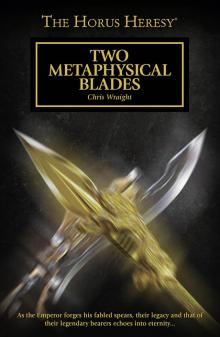 Two Metaphysical Blades
Two Metaphysical Blades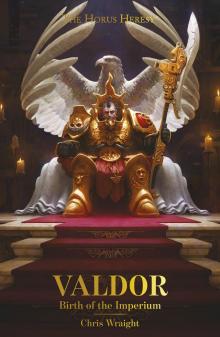 Valdor: Birth of the Imperium
Valdor: Birth of the Imperium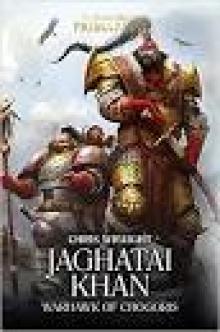 JAGHATAI KHAN WARHAWK OF CHOGORIS
JAGHATAI KHAN WARHAWK OF CHOGORIS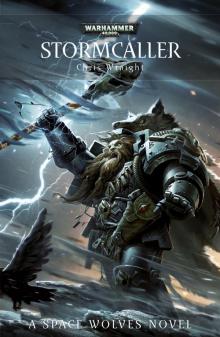 Stormcaller
Stormcaller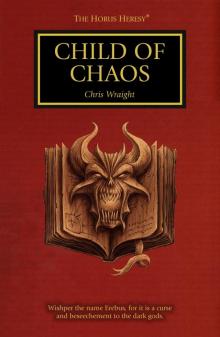 Child of Chaos
Child of Chaos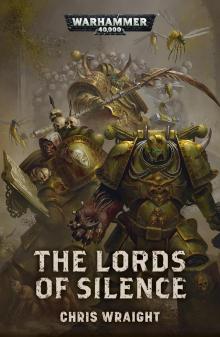 The Lords of Silence
The Lords of Silence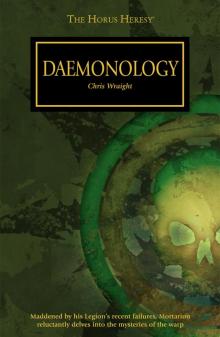 Daemonology
Daemonology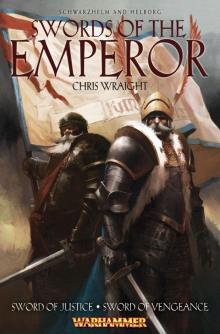 Swords of the Emperor
Swords of the Emperor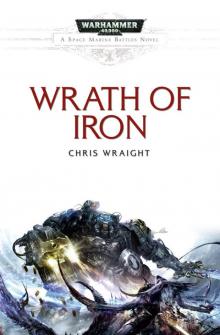 Wrath of Iron
Wrath of Iron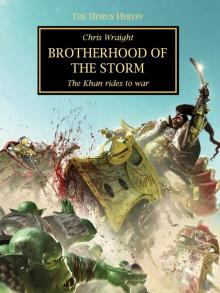 Brothers of the Storm
Brothers of the Storm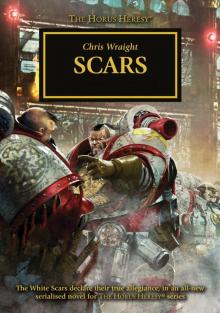 Horus Heresy: Scars
Horus Heresy: Scars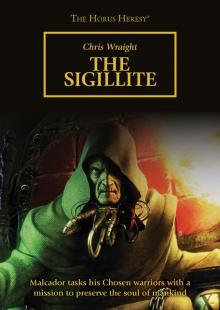 The Sigillite
The Sigillite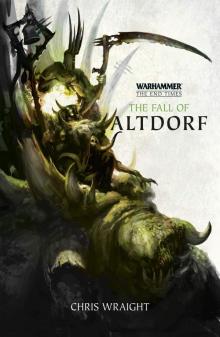 The End Times | The Fall of Altdorf
The End Times | The Fall of Altdorf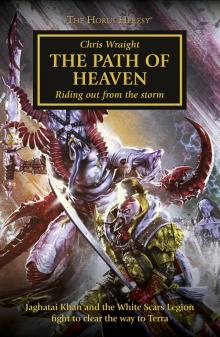 The Path of Heaven
The Path of Heaven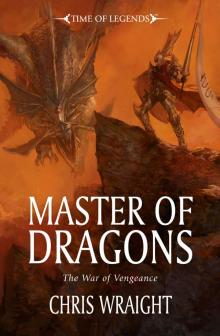 Master of Dragons
Master of Dragons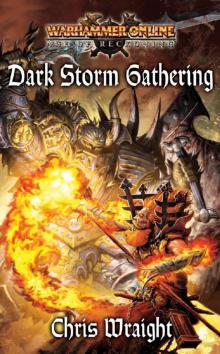 WH-Warhammer Online-Age of Reckoning 02(R)-Dark Storm Gathering
WH-Warhammer Online-Age of Reckoning 02(R)-Dark Storm Gathering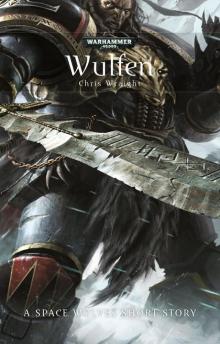 Wulfen
Wulfen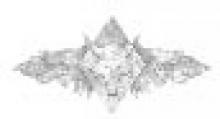 Battle Of The Fang
Battle Of The Fang Onyx
Onyx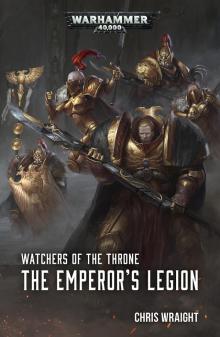 Watchers of the Throne: The Emperor’s Legion
Watchers of the Throne: The Emperor’s Legion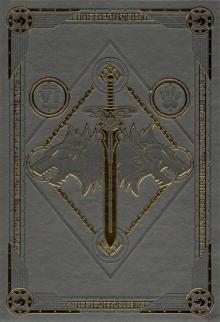 Leman Russ: The Great Wolf
Leman Russ: The Great Wolf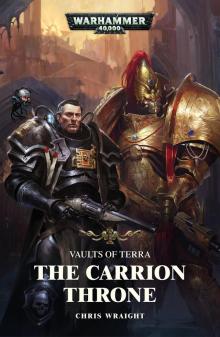 Vaults of Terra: The Carrion Throne
Vaults of Terra: The Carrion Throne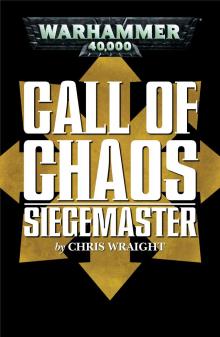 Siegemaster
Siegemaster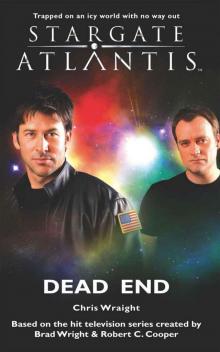 STARGATE ATLANTIS: Dead End
STARGATE ATLANTIS: Dead End Scars
Scars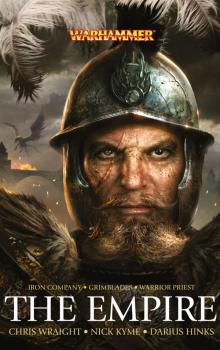 The Empire Omnibus
The Empire Omnibus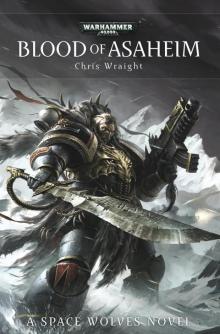 Blood of Asaheim
Blood of Asaheim